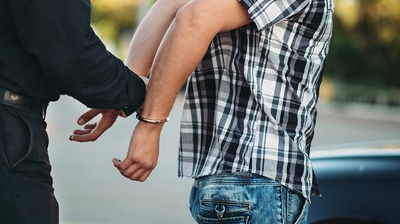
-
 Step 1: The ArrestDon’t let the police take advantage of you while you’re in custody. Call Walsh Law right away, and we’ll get to work protecting your rights so you don’t inadvertently self-incriminate.
Step 1: The ArrestDon’t let the police take advantage of you while you’re in custody. Call Walsh Law right away, and we’ll get to work protecting your rights so you don’t inadvertently self-incriminate. -
 Step 2: The ArraignmentWalsh Law is an aggressive Folsom criminal defense firm that can argue for reasonable bail and help you await the end of your case from the comfort of your home.
Step 2: The ArraignmentWalsh Law is an aggressive Folsom criminal defense firm that can argue for reasonable bail and help you await the end of your case from the comfort of your home. -
 Step 3: Pre-Trial HearingsWe’ll evaluate the prosecution’s case, challenge weak evidence and inconsistencies, and do our due diligence to get the charges against you reduced or dropped.
Step 3: Pre-Trial HearingsWe’ll evaluate the prosecution’s case, challenge weak evidence and inconsistencies, and do our due diligence to get the charges against you reduced or dropped.
Folsom Juvenile Criminal Defense Lawyers
Aggressively Defending Accused Minors in the Sacramento Region
While facing criminal charges can be daunting at any age, it can be all the more intimidating for children and teenagers. Despite legal differences between the juvenile and adult criminal justice systems, juvenile court can be unforgiving and cruel to minors, who are especially susceptible to criminal behaviors due to their developing brains and lack of life experience.
Regardless of the severity of the crime, partnering with a skilled juvenile defense attorney is critical to pursuing the best outcome for your child. At Walsh Law, we understand how frightening it can be to watch a minor undergo the criminal justice system. That’s why our firm provides compassionate representation to families navigating the legal intricacies of juvenile court in Folsom and beyond. From shoplifting to vandalism, our lawyers vigorously defend the rights of minors throughout Greater Sacramento.
A juvenile conviction can negatively affect your child’s health and future. Don’t wait to secure a robust defense. Contact us online or call us at (916) 610-3558 to discuss your case.
Common Juvenile Charges We Defend Against
At Walsh Law, we recognize the unique struggles that minors face within the juvenile justice system. That’s why our experienced advocates provide personalized and robust legal strategies to mitigate the consequences of criminal charges on a young person’s life. We can help you understand the specific nature and potential ramifications of juvenile charges while diligently protecting your child’s future.
Our lawyers defend against a wide range of juvenile offenses, including:
- Vandalism: From spray-painting buildings to breaking windows, vandalism involves willfully damaging or defacing property (PC § 594). Acts of vandalism can result in severe penalties for minors, making it crucial to secure an experienced defense.
- Possession of graffiti tools: Minors found with vandalism items like spray paint or markers can face criminal charges if there is evidence of intent to deface property (PC § 594.6).
- Burglary: Entering a building or property without permission with the intent to commit a crime inside is classified as burglary (PC § 459). For juveniles, this charge can carry long-term consequences if not properly defended.
- Shoplifting: This offense involves taking merchandise from a store without paying for it (PC § 459.5). Shoplifting can severely damage a minor’s record and reputation, as well as impact future educational and employment opportunities.
- Petty theft: Petty theft involves the unlawful taking of property that is valued under $950 (PC § 484). Regardless of property value, a petty theft conviction can have significant implications for a juvenile’s future.
- Joyriding: The unauthorized use of someone else’s vehicle can lead to joyriding charges, even without the intent to permanently deprive the owner of it (VC § 10851).
- Trespassing: Entering someone else’s property without permission can lead to trespassing charges. These offenses can range from simply being on private land to more serious instances involving restricted areas (PC § 602).
Other common crimes committed by minors include sexting, gang crimes, and possession of alcohol or marijuana.
How Does the Juvenile Court System Work?
Unlike the adult criminal justice system, juvenile courts focus on rehabilitation instead of punishment. The goal is to help minors understand the consequences of their actions and provide them with resources and support to prevent future criminal behavior. Once a child or teenager is arrested, they may be released into the custody of their parents or placed in a juvenile detention center. From there, they will go through a series of hearings and court proceedings before a judge who will determine their sentence.
Juvenile Crimes FAQ
What constitutes a juvenile crime?
A juvenile crime is any illegal act committed by a person under the age of 18. These offenses can range from minor infractions, such as truancy or vandalism, to more serious crimes like theft, assault, or drug offenses. The legal system treats these cases differently due to the age of the offender, focusing on rehabilitation rather than punishment.
What defense strategies are available for juvenile crime charges?
Defense strategies for juvenile crimes often focus on the minor's age, maturity, and intent. Possible defenses include lack of intent, influence of peer pressure, or questioning the legality of the arrest and evidence collection. An attorney may also advocate for diversion programs or alternative sentencing to emphasize rehabilitation.
How does the juvenile justice process differ from the adult system?
The juvenile justice system is designed to focus on rehabilitation and education rather than punishment. Proceedings are typically more informal, and the privacy of the juvenile is often protected. The process may include detention hearings, adjudication, and disposition, with an emphasis on treatment programs, community service, or probation instead of incarceration.
What is the impact of a juvenile record on a young person's future?
A juvenile record can have lasting consequences, potentially affecting education, employment, and housing opportunities. However, many jurisdictions offer options for sealing or expunging juvenile records, allowing individuals to start anew without the burden of a criminal history. Legal counsel can help navigate this process and advise on the best course of action to mitigate these impacts.
Can a juvenile be tried as an adult, and what factors influence this decision?
In certain cases, a juvenile may be tried as an adult, especially if the crime is particularly severe or if the juvenile is a repeat offender. Factors that influence this decision include the minor’s age, the nature of the offense, and their prior criminal history. Being tried as an adult can lead to harsher penalties, making it essential to have experienced legal representation to argue against such transfers.
Values You Can Relate To
Client Testimonials

-
“I am always able to get ahold of him directly either by cell or text including after hours and if for some reason he isn’t immediately available, he responds as soon as he can.”- Melissa C.
-
“He was compassionate and explained to me what to expect in an easy way for me to understand. He was straightforward and delivered on what he said he could do for me!”- Claudia H.
-
“I was in a bit of a situation and public defenders weren’t doing anything to help my case as if they didn’t have time. Which they don’t, but Chris Walsh did and came up with a few methods to fight my case.”- Dewan P.






